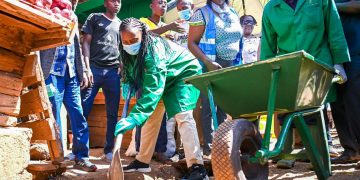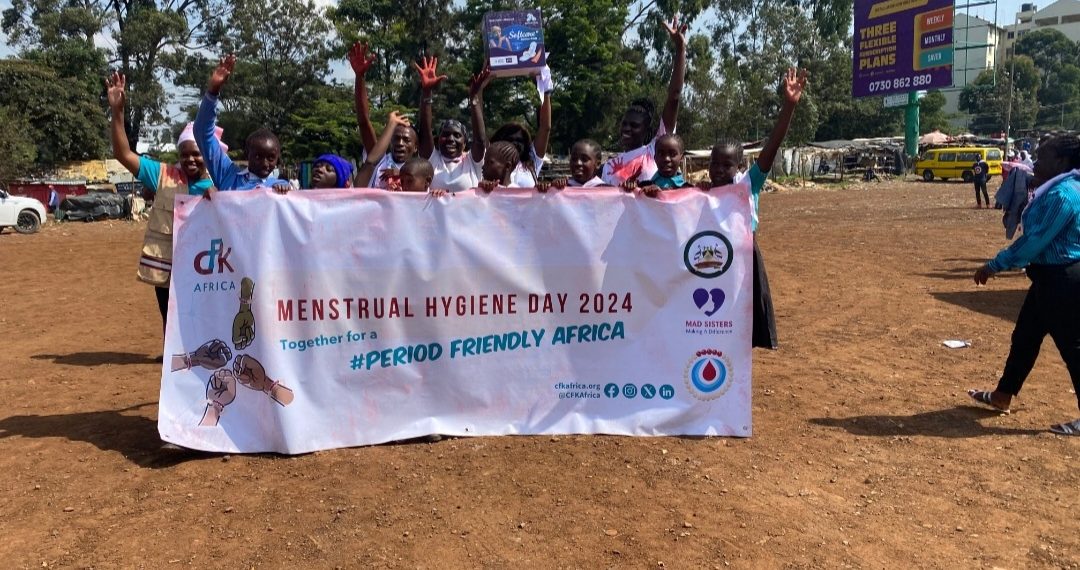The world is celebrating Menstrual Hygiene Day, an initiative aimed at creating a period-friendly world for women and girls. This day holds particular significance for the most marginalized communities in Kenya, where menstruation is surrounded by numerous taboos and widespread misinformation.
Speaking at a commemoration event held in Kibera-one of the largest informal settlements in Kenya, Miss Siama Ajabsidu, the Program Officer for the Girls Empowerment Program at CFK Africa, emphasized the importance of menstrual hygiene and the profound impact of educating girls in informal settlements. Miss Ajabsidu detailed CFK Africa’s efforts to support girls in these communities.
“It’s all about breaking the stigma and taboos surrounding menstrual hygiene management and empowering the community,” said Miss Ajabsidu. “We aim to sensitize them to the fact that menstruation is a natural and normal biological process.”
In Kenya, the challenges related to menstrual hygiene are particularly pronounced in marginalized areas. Taboos and misinformation lead to shame and discrimination, making it difficult for girls to manage their periods safely and with dignity. The lack of access to menstrual products, sanitation facilities, and proper education as well as gender and sexual based violence among young girls exacerbates these issues, often leading to girls missing school during their menstrual periods.
Addressing these issues Miss Ajabsidu said, “there is still a lot of stigma around menstruation and most of the girls in these informal settlements often cannot afford sanitary towels, this can cause them to miss school from embarrassment, we at CFK aim to restore the dignity of these girls by providing them with sanitary towels on a monthly basis in the hope of retaining them in school.”
She added, “We also hold special sessions in schools once a week. It’s all about empowering girls with knowledge about their reproductive health, ensuring they can make informed decisions about their reproductive choices. We educate them on the increased vulnerability to pregnancy once they start menstruating, which can significantly alter their lives. Our goal is to keep them engaged, empowered, and informed, so they can make the best decisions for their future.”
Other interventions
CFK Africa has been at the forefront of addressing these challenges. The organization provides menstrual hygiene education, distributes sanitary products, and works to improve sanitation facilities in schools and communities. By doing so, they aim to ensure that girls can attend school confidently and without interruption.
CFK Africa combats extreme poverty in 25 informal settlements across eight counties in Kenya through integrated youth leadership and public health initiatives.
Due to poverty and gender-based and sexual violence, many young girls find themselves pregnant before finishing school. To address this, CFK has initiated several programs alongside their sanitary distribution efforts to ensure a more profound impact on these young girls’ lives.
“We have a special scholarship program for teenage mothers called Funzo, which aims to support teenage mothers in four informal settlements. The goal is to keep them in school by offering full scholarships for both primary and secondary education. We cover their school fees and provide the necessary materials and equipment they need to stay in school. Additionally, we run a special program designed to ensure they do not become victims of a second pregnancy.”
Menstrual Hygiene Day is celebrated globally with events, campaigns, and initiatives aimed at promoting menstrual health and hygiene. This years’ theme is a #PeriodFriendlyWorld














